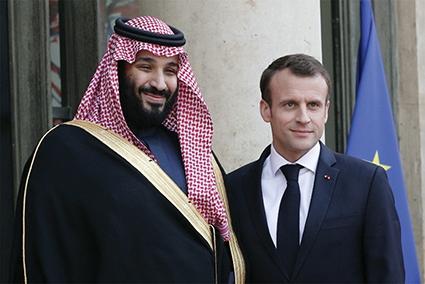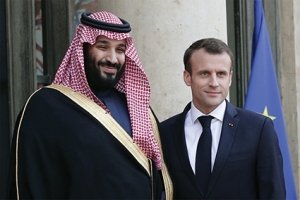An Explosive Mix – Analysis of the Western-Eastern Power Gamble in Syria
Analysis
It may not be something that strikes the eye, as we are used to hearing atrocious news from Syria. But the recent verbal, and partially already physical hostilities between Russia, US, Israel and Iran, in conjunction with the involvement of Saudi Arabia, Turkey, France and the United Kingdom, are all taking place in an Arab nation whose statements haven’t been echoed through global news outlets the recent days at all. The rather small country in the Levant developed from an internal revolution of sectarian groups, whose different military advances and losses have dominated media coverage initially, in a global playground of virility.
The last few days have been messy, as the involved presidents and prime ministers follow their own personal desires, disregarding any responsibility they might have towards the international community. Syria has been turned into an “after-work bar,” where things outside the legal norm are allowed and confrontations are sought without thought of the consequences. The danger, besides the pointless rowdiness on the backs of Syrian lives, is the very likely escalation of the conflict to areas outside of Syria. As so often happens in bar fights, the exact starting point seems almost forgotten as the conflict goes on. And if remembered, no one really knows who started it or if everything they said was really meant in the way it was taken.
What exactly are the interests turning the conflict into such a chaotic mess? Starting with the place of the theater, Assad has clearly vowed to take the country back under his control, being on the verge of defeating the opposition forces which are pent-up in remaining areas in the north and the south of the country. Their infrastructure is cut and only supplies from allies keep them alive. Backed by Iran and Russia, Assad’s main purpose may be the clearest one: to take full control of the pre-civil war Syrian territory. However, having destroyed ISIS, the Kurdish forces in the northeast, and the Turkish forces along the border, still have a powerful position to defend themselves. Surviving this civil war with just Russian and Iranian support, an Assad-controlled Syria will basically become a Russian/Iranian foreign policy outpost with militia and spies; a situation undesired by all neighboring states.
These developments forced Israel to actively enter the conflict to demonstrate their unwillingness to accept such an outcome. Their basic rule of non-engagement is only maintained when ensured that Iranian forces won’t get a hold in Syria. However, as Assad is winning with Iranian help, Israel is determined to eliminate the Iranian military presence in the area. A simple calculation which could turn the tables up-side-down again in the war: “We don’t care how the Syrian civil war ends, but the current outcome is unacceptable.”
Surrounded by Hezbollah in the north, Iranian-backed and heavily armed, Israel fears additional Iranian-backed militia along the Syrian border after the war is over. In addition, Hezbollah gained much more autonomy over the recent years from Tehran, which makes them an almost better enemy than Iranian forces in Syria, which are directly commanded by the Islamic regime at the Persian Gulf. These forces are a red line for Israel, as Netanyahu and his Defense Minister, Avigdor Lieberman, have reiterated in various statements. The absence of Western allies in toppling Assad forced Israel to enter the conflict by targeting an Iranian military presence three days ago, peppering up this conglomeration of different interests. The Israelis have also found their perfect prime minister for such a standoff, as Netanyahu throws threats at Iran on a repeated basis, stating Wednesday that Iran shouldn’t “test Israel’s resolve.” In addition, the situation gives Netanyahu a perfect distraction from internal political turmoil- police questioned him last month on various corruption cases. As if this is not enough, the Israelis are able to distract from the Gaza riots taking place in parallel, which have been causing international outcry, now occupying the international community with avoiding a destabilization of the Syrian civil war.
Iran is perfectly following up on Israel’s fears. The Ayatollah regime finally sees itself able to gain a direct foothold in the Mediterranean Sea. Through a Shia government in Iraq and Hezbollah in the south of Lebanon, Syria enables a direct land link all the way to European waters. Iran, which is in constant battle with Saudi Arabia to establish Middle Eastern hegemony, could pocket a fundamental victory painful for the Al Saud royal house. Iran is meddling in numerous states in the region, from obvious options such as Bahrain to less obvious ones as Georgia, where Iranian websites pop-up speaking directly to the Azerbaijani minorities in the south of the country. Iran knows, however, that a direct military confrontation with Israel or Saudi Arabia will create further turmoil in the region, something which is not in their interest as it would mean less actual control of the Middle East. In addition, Hezbollah repeatedly stated their intention to maintain peace in Lebanon, thus questioning their support for Israel if Lebanon is not directly involved in the conflict. So far, Iran’s most obvious military efforts are limited to proxy wars in Yemen and Syria.
The Saudis are quite calm these days. Their crown prince and actual political thread-puller Mohammad Bin Salman, or MBS, has been hiding behind the French in Paris while proclaiming his support for a military operation in Syria. The Saudi position has weakened over the last months. After the confusion over the resignation of Lebanon’s prime minister, which was allegedly instigated by the Saudis yet withdrawn days later as Lebanese politicians kept a cool head, refusing to let foreign politics interfere their political debate, the Saudis are being careful when spearheading new military efforts. Their decision to remain outside the spotlight is spurred by the endless proxy war in Yemen as well as France’s new efforts to involve themselves in Middle Eastern politics. Hiding behind Western military efforts may also give the Saudis the confidence to win a potential confrontation, while being unaccountable if the Syrian civil-war should turn out against their wishes.
One of the most underestimated actors in this new rise of tensions may be France and its prepotent President, Emmanuel Macron. Having grabbed the opportunity to resolve the Lebanese prime minister standoff, Macron generated new momentum for French Middle Eastern policies. His subtle and soft power decisions to finance museums in the Gulf or help political standoffs have made Macron one of the first point of contacts for Arab leaders in search for Western allies, especially with Downing Street and the White House being run by a powerless and an incalculable leader, respectively. Just days before the recent surge in verbal attacks, Paris was center to an economic summit to finance Lebanese development projects. Macron succeeded in arranging billions of additional funds for the small Mediterranean country through the coming years. Recent comments made by the French President also show a great determination to enter the Syrian civil war. Calls between the White House and France have taken place, assuring mutual support. It remains to be seen if Macron’s efforts, covered under a humanitarian blanket, will complicate the conflict or generate solutions, as his team has done in Lebanon. I tend to speculate the former.
There is still one actor totally disregarded by the wider public, which is the United Kingdom. Theresa May reminds one of a school child trying to be one of the cool kids in fear of missing out. The Skripal case is still not forgotten and the British public longs for national pride, creating the perfect excuse for May to engage in the conflict. Following on the heels of Macron and Trump, May met with top national security advisors to work out plans for different military options. According to recent news reports, U-boats and “Tomahawk” missiles are already positioned in the Mediterranean Sea, ready for a potential mission. This conflict allows May to strengthen her position again, which has been a reoccurring solution for British prime ministers trapped in internal politics. Like Netanyahu, an intervention in Syria would force British media to focus on foreign policy rather than internal power gambles.
Another actor on the sidelines these days is Turkey. Having intervened in the north of Syria to contain Kurdish forces, the main thorn in Erdogan’s side is Assad and the Kurds fighting for an independent state. Over recent years, Turkey has developed its own national strategy for the Syrian conflict. Initially profiting from ISIS oil exports, Turkey distanced itself from NATO and the West and met with Russia and Iran to discuss Syria on multiple occasions. Yet he dislikes Assad and hopes to oust him. More important for Turkey is the fight against the Kurds rather than engaging in the power gamble. Additionally, the AKP follow a strategy of national pride, not wanting to side with either the West or the East, entering the game with their own national strategy of creating a stronger hegemony in the Middle East. If escalations continue, Turkey is expected to operate behind the lines to increase its influence.
Which brings us to the main actors, the US and Russia. The US is considered an incalculable nation under Trump, but looking closer, the “deep state” still controls his actions quite heavily. Trump and his twitter account are quick in condemning military actions in Syria and are also quick in threatening the other parties involved, but his desire to not intervene with ground forces has been made clear. The power game he is playing could be understood as a repetition of the game he played with Kim Jong-Un at the beginning of the North Korea crisis last year. After a spike in tensions, relations normalized and a meeting between the two leaders is in sight. The alleged chemical attack forced Trump to be interested in a conflict which he rather desires to forget on his daily agenda. The worrying thing about his recent comments is the support coming from Macron and May, which usually follow up on their promises. America is worried to lose the hegemony in the Middle East, which has been fading since the Iraq war. Afghanistan is a disaster and an American intervention is unlikely to solve the problems in Syria either. One aspect which shouldn’t be forgotten is the Jewish lobby in Washington. If Israel is adamant about their threats and determined to oust Iranian forces from Syria, the White House may feel forced to act in a stronger manner.
As of going to press, Putin is playing the smart diplomat, demanding proof of the chemical attack and denouncing Trump’s “Twitter Diplomacy,” calling on Netanyahu to stay out of Syria to avoid further destabilization. Their chemical attack may have been an attempt by the Russians and Assad to test the waters and to see the likelihood of the West responding, but Putin also knows that the interest in Syria before the alleged attack was minuscular, paving his way to victory with Assad. Right now, he is keeping his eyes open but, as always, his options are the most dubious. He may just wait until the West calms down enough to turn their back on Syria again.
And so the bar fight enters a new stage, with it being unknown if the different actors will go out onto the street in their squabble, bringing passersby into the fray…or whether they’ll keep to their little fights inside the walls of Syria. The police forces patrolling the bar, called the UN, seem to be on vacation or have perhaps simply realized that their baton is not strong enough. Opposite the Syrian bar, China and others are seated observing the fight whilst calmly negotiating a new way of influence with other uninvolved states.
Keep updated with the latest news on georgiatoday.ge.
By Benjamin Music












